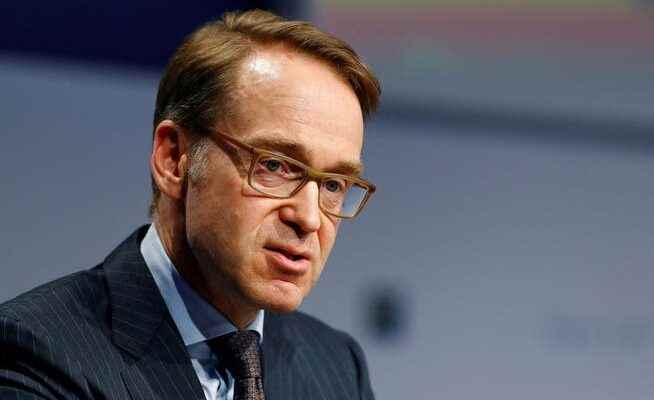Almost a year after resigning from the Bundesbank, Jens Weidmann has the prospect of a new management role. He is to replace the 71-year-old Helmut Gottschalk as head of the supervisory board of Commerzbank, which is in a permanent crisis. The timing seems favourable.
Jens Weidmann, who has a doctorate in economics and was the former president of the Deutsche Bundesbank, is to become the new head of the Commerzbank supervisory board.
Commerzbank has been in an almost permanent state of restructuring and transformation since the financial crisis around fifteen years ago. But now the bank has pulled off a coup: the former president of the Deutsche Bundesbank, Jens Weidmann, is to take over the chairmanship of the supervisory board next year. Weidmann would thus follow in the footsteps of Axel Weber, who was also Bundesbank President for many years and then took over the management of the board of directors of the major Swiss bank UBS.
Parallels of two careers
After Deutsche Bank and the cooperative DZ Bank, Commerzbank is Germany’s third-largest private financial institution in terms of total assets. According to a statement by Commerzbank early on Saturday evening, the previous Chairman of the Supervisory Board, Helmut Gottschalk, has decided not to be available for a new term after the next Annual General Meeting next spring due to his age.
Gottschalk informed Commerzbank’s Presidential and Nomination Committee of his decision on Saturday and, in consultation with the Federal Ministry of Finance, proposed Jens Weidmann as a new member of the Supervisory Board. If elected, the economist will be available as chairman of the supervisory board. The implementation of this plan should be a matter of form. Weidmann was President of the Deutsche Bundesbank from 2011 to 2021 and in this capacity also a member of the Governing Council of the European Central Bank (ECB). Before that, the 54-year-old worked as head of the economic and financial policy department in the Federal Chancellery.
Born in Solingen and now living in Wiesbaden, he studied economics at the University of Bonn and completed his dissertation with the renowned monetary theorist Manfred Neumann. Second reviewer of the work was the Bonn professor at the time, Axel Weber, who later became President of the Bundesbank. These should not remain the only points of contact and parallels in the careers of Weidmann and Weber.
Frustration with ECB monetary policy
Axel Weber was President of the Bundesbank from 2004 to 2011 and was one of the key figures in Germany during the financial crisis and the European sovereign debt crisis. He finally resigned as President of the Bundesbank mainly because he no longer wanted to support the central bank’s monetary policy, which was already very loose at the time. At that time, the ECB had started buying government bonds.
A year later he moved to Switzerland, where he was Chairman of the Board of Directors of UBS from 2012 to 2022. However, the Swiss board of directors has a much more operational and strategic role than the German supervisory board of a company. After that, Weber moved to the head of the Center for Financial Studies (CFS) at the Goethe University in Frankfurt this year, succeeding Otmar Issing. For Weber, this is a return to an earlier place of work.
Weidmann resigned as Bundesbank President and member of the Governing Council at the end of 2021 for personal reasons. According to reports, frustration with the ECB’s ultra-loose monetary policy and the limited scope for influencing this policy in the ECB Council also played an important role. In addition, Weidmann was at an age when he could still take on a new challenge. Just as Weber came to UBS in a crisis and phase of transformation, Weidmann is now doing the same at Commerzbank.
The change is not unproblematic insofar as the Bundesbank has deep insights into many German banks. A cooling-off phase for Weidmann of just under a year and a half until May 2023 should probably be sufficient, especially since the position of the chairman of the supervisory board is not essentially an operational activity, but rather a controlling one.
Commerzbank was partially nationalized during the financial crisis. Germany is still the bank’s largest shareholder with 15.6 percent. Since then, the bank has slipped into the red again and again and has been undergoing a quasi-continuous transformation. In the past few years, there have once again been many changes on the Supervisory Board and the Management Board. Now the bank also needs more stability in management.
return to profitability
Under the new CEO Manfred Knof, the institute seems to be getting back into somewhat calmer waters during the ongoing restructuring. Rising interest rates, which have a very positive effect on Commerzbank’s earnings, are also helping here. This trend is likely to continue for a while. In 2021, the bank with its 46,500 employees had generated gross income of 8.5 billion euros and, after losing billions in the previous year, had surprisingly returned to the black.
However, given the approaching recession in Germany, further restructuring is not likely to be a sure-fire success. The Polish subsidiary mBank, the branch infrastructure, digitization and legacy issues are likely to continue to occupy the institute. The bank, which its competitors like to mockingly refer to as “the Commerzamt”, has also been considered a takeover candidate for years. So far, however, no potential buyer really wanted to touch the bank.
SYou can the Frankfurt business editor Michael Rasch on the platforms Twitter, linkedin and Xing follow.
